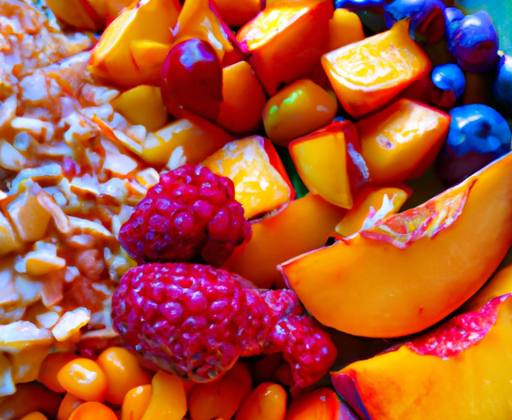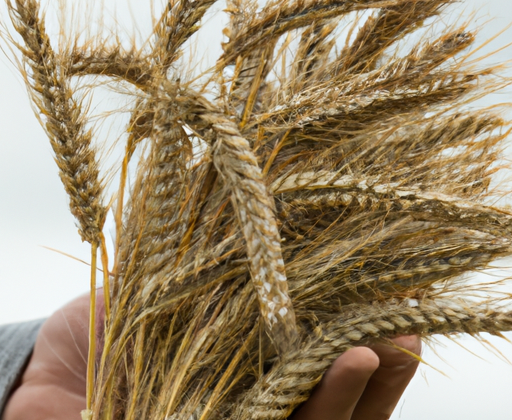Climate Change and Food Systems: A Scary Reality
Hey there, folks! Let’s talk about something that’s been keeping me up at night: climate change and its impacts on our food systems. It’s a scary reality we’re facing – but before we dive in, let’s make sure we’re on the same page. When we talk about climate change, we’re referring to the long-term changes in Earth’s average climate, which are mainly caused by human activities such as burning fossil fuels and deforestation. These changes have led to a wide range of impacts on our food systems.
Currently, we’re seeing changes in growing seasons, decreased yields, and increased pest and disease pressures. Climate change also affects food access, particularly in lower-income countries that rely heavily on agriculture as a source of livelihood. As someone who deeply cares about our food systems, we must do something to adapt and mitigate these impacts.
Now that we have an overview of climate change and its impacts on food systems, let’s dive deeper into the causes and solutions. This is where it gets interesting!
Causes of Climate Change & Food System Impacts: What’s Causing the Crisis?Climate change is a hot topic today, and for a good reason. There are many causes that contribute to climate change and impact food systems around the world. Greenhouse gas emissions, soil degradation, and water scarcity are some of the main factors that have led to such a crisis.Greenhouse gas emissions are one of the biggest contributors to climate change. These emissions, such as carbon dioxide and methane, are released from various sources, including burning fossil fuels, transportation, and industrial processes. By trapping the heat within our atmosphere, greenhouse gases contribute to global warming, which has a severe impact on our food systems.Soil degradation is another factor that is contributing to the problem of climate change. Soil degradation happens when the soil becomes deprived of the nutrients needed for plant growth. Overuse of pesticides and chemical fertilizers, along with deforestation and other environmental factors, has led to severe soil degradation, reducing soil quality and food production capacity.Water scarcity is another significant issue we face today. With climate change, water scarcity is becoming more common, and this is affecting food production. The increase in temperature and extreme weather conditions caused by climate change has led to less water in certain regions, which can cause droughts and water scarcity.In conclusion, greenhouse gas emissions, soil degradation, and water scarcity are some of the significant causes that impact food systems around the world. It’s important that we take immediate action to find solutions to these issues before it’s too late.
Solutions to Adapting to Climate Change in Food Systems
Alright, now that we’ve talked about what climate change is and how it affects our food systems, let’s talk about some solutions. It can be overwhelming to think about how to adapt to climate change, but the good news is that there are concrete steps we can take to make a positive impact. In this section, I’ll introduce a few potential solutions that can help us adapt to a changing climate.
Improving Agricultural Practices
One solution to adapting to climate change is improving our agricultural practices. This means using techniques that promote soil health, like crop rotation and cover crops, to improve soil fertility. It also means reducing the use of chemical fertilizers and pesticides, which can contribute to soil degradation and pollution. By improving soil health, we can increase crop yields and produce more nutrient-dense food.

Another key solution is to utilize renewable energy sources in food production. This means investing in solar-powered irrigation systems, wind turbines, and other forms of clean energy to power farms. This reduces reliance on fossil fuels, which contribute to greenhouse gas emissions and climate change. Using renewable energy also makes farming less reliant on centralized power grids, which can be vulnerable to disruptions from extreme weather events.
Reducing Food Waste
A third important solution is to reduce food waste. Food waste is a major contributor to greenhouse gas emissions, and reducing waste can help us make more efficient use of our resources. This can involve everything from composting food scraps to reducing portion sizes and using imperfect produce that would otherwise go to waste. By reducing food waste, we can also save money and reduce the carbon footprint of our food systems.
Overall, adapting to climate change in our food systems will require a combination of these and other solutions. By working together, we can build a more resilient food system that can withstand the challenges of a changing climate.
Examples of Successful Adaptations
So, as I mentioned earlier, climate change is having a huge impact on our food systems. But there are things we can do to adapt! Let me share with you some successful examples of adapting to climate change in our food systems.
Regenerative Agriculture
Have you heard of regenerative agriculture? It’s a farming technique that focuses on restoring soil health. By increasing organic matter and nutrients in the soil, farmers are able to increase crop yields and reduce the impact of droughts and floods. And guess what? Regenerative agriculture also helps to sequester carbon from the atmosphere, which can help mitigate climate change. I recently read about some farmers who have successfully implemented regenerative agriculture in their farms and have seen impressive results.
Solar-Powered Irrigation Systems
Water scarcity is a huge problem in many parts of the world, but especially in areas where food production heavily relies on irrigation. However, there are sustainable ways to address this issue. For example, some farmers have adopted solar-powered irrigation systems, which allow them to pump water from underground aquifers or rivers using solar energy. This eliminates the need for fossil-fuel-powered pumps, which can be expensive and damaging to the environment.
Community Composting Projects
Did you know that food waste is a major contributor to climate change? When organic waste ends up in landfills, it releases a potent greenhouse gas called methane. But there’s a simple solution: composting! Many communities have started composting projects that turn organic waste into nutrient-rich soil. These projects not only reduce greenhouse gas emissions but also provide a valuable resource for local farmers and gardeners. I recently participated in a community composting project and was amazed at how easy it was to divert food waste from the landfill.
These are just a few examples of successful adaptations to climate change in our food systems. There are many more out there! By implementing sustainable practices in our food production and consumption, we can help mitigate the impact of climate change on our food systems. If you want to learn more about this topic, I highly recommend checking out this article on preparing for a food-secure future. Let’s work together to create a more sustainable and resilient food system!
My Closing Thoughts…
Well folks, that’s a wrap! After exploring the causes and solutions to the impacts of climate change on our food systems, it’s clear to me that we have some work to do. But don’t fret! There are plenty of successful strategies out there that we can learn from and implement in our own communities.
First and foremost, it’s crucial that we improve our agricultural practices. This means using sustainable methods to protect the soil, promoting biodiversity, and reducing the use of harmful pesticides and fertilizers. We also need to shift towards renewable energy sources, such as solar-powered irrigation systems, and reduce our food waste.
If you’re looking for success stories to inspire you, look no further than the regenerative agriculture movement and community composting projects. Both of these initiatives aim to restore the health of our soil and reduce waste, while at the same time helping communities to become more resilient in the face of climate change.
So, fellow foodies and climate enthusiasts, let’s put our heads together and start taking meaningful action to combat the impacts of climate change on our food systems. With a little creativity and collaboration, I know we can make a difference!

